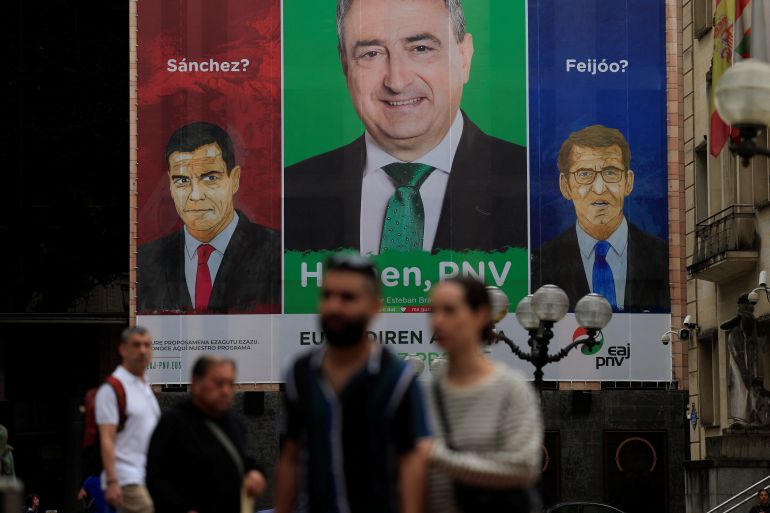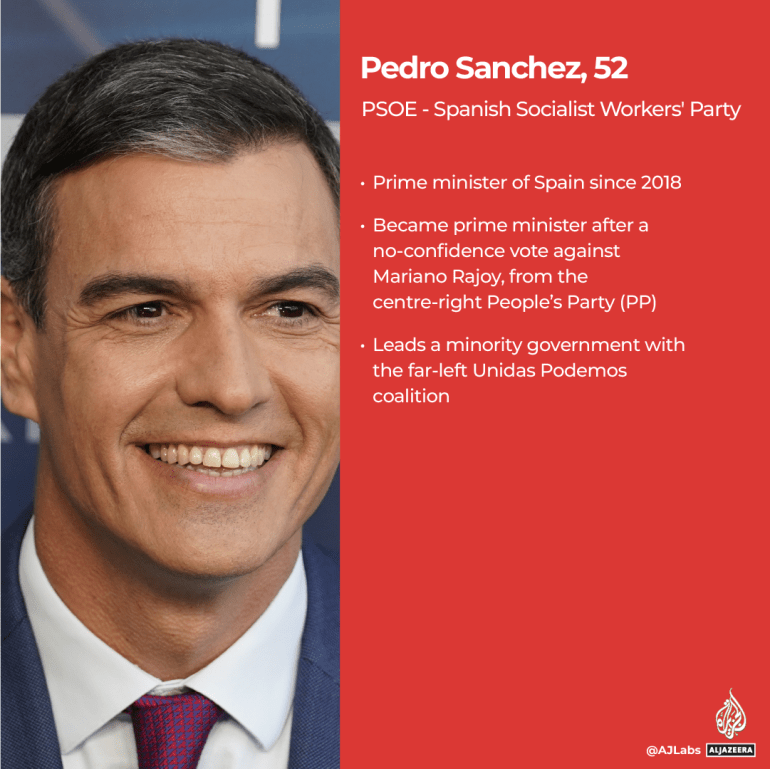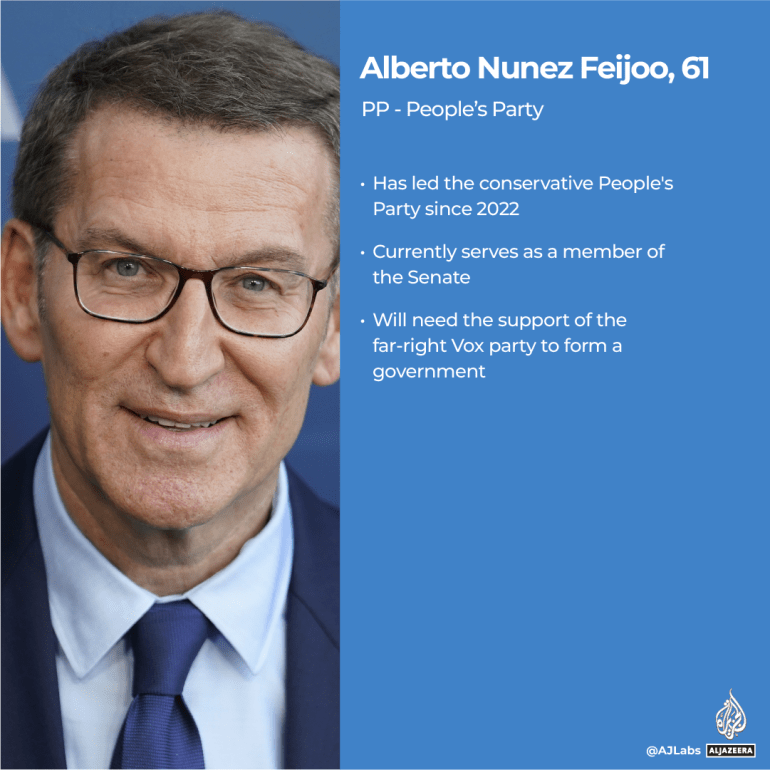After Spain’s right fell short of outright victory, what next?
An uncertain future awaits Spain after Partido Popular performed worse than expected while the Socialists rebounded.

Madrid, Spain – The lack of a clear winner in Sunday’s snap elections in Spain leaves the country teetering on the brink of a fresh spell of major political turbulence, with both of its main parties struggling to find a clear path towards forming a new government.
Most pre-election polls had suggested the conservative Partido Popular (PP) would secure a large enough share of the vote to oust the ruling Spanish Socialist Workers’ Party (PSOE), albeit needing the hard-right Vox formation as its junior partner in government.
Keep reading
list of 4 itemsSpain’s snap election: Is the far right on the verge of power?
Will Spain shift to the right?
Spain in ‘political limbo’ after election yields no clear winner
Yet despite the PP winning the most seats, their combined total with Vox of 170 deputies failed to add up to the absolute majority needed to gain power.
Meanwhile, an unexpected slight boost in the PSOE’s support saw the Socialists rebound from their stinging losses in May’s regional elections and could yet see Prime Minister Pedro Sánchez and his hard-left Sumar allies form another minority government.
“The PP may have won the elections, but in fact they’ve suffered a huge defeat,” Oriol Bartomeus, research professor at the Institute of Political and Social Science at the Autonomous University of Barcelona, told Al Jazeera.
“They’ve fallen so far short of their predicted success that their strength in negotiations is seriously impaired, and the days of Alberto Núñez Feijóo as PP party leader are likely numbered, too. He had one shot at taking power, and he missed.”

Bartomeus said the PP has become so closely associated with Vox that they can’t reach out to the moderate Basque Nationalist Party (PNV) for support – as has happened with two previous PP governments – “because the two parties just wouldn’t work together”.
On the other side of the political fence, Sánchez would once again need to rely on multiple Basque and Catalan pro-independence parties to maintain his slight numerical advantage over the PP and Vox.
“It’s complicated, because the Catalan parties have suffered a serious setback in the elections and it remains to be seen what they’d ask for in exchange for supporting Sánchez,” Bartomeus said, noting that if neither the PP nor the PSOE can form a government, “then we’re set for fresh elections in October or November”.
‘Socialists can frame relative defeat as success’
The Socialists’ delight at the narrowness of their electoral defeat was palpable at their Madrid headquarters on Sunday night, with crowds repeatedly chanting “No pasarán, no pasarán” – the “they shall not pass” slogan first made famous by Spanish Republicans in the 1936-39 Civil War when successfully resisting their Fascist enemies.
Just a few blocks away across central Madrid at the PP’s main base, crowds celebrating the party’s win were notably smaller than in previous general election victories. And despite the loud music blaring on the streets and a DJ’s best efforts to raise their spirits, few appeared to be in the mood to dance.
“It’s a question of expectations,” Bartomeus said.
“The way the right-wing media bombarded the public with polls through the campaign saying the Socialists were set for a debacle means the Socialists can frame this relative defeat as a success.”
“Sánchez’s decision to call snap elections was very risky, because there have been some moments during the campaign when it looked like he’d blown it, but he’s got through it by the skin of his teeth.”

At the grassroots level, PP supporters are seriously dismayed at the Socialists’ ability to retain a slender chance of holding on to power, and their own party’s even smaller options on wresting it from them.
“It’s a disaster for the country,” PP supporter Jesús Rubio told Al Jazeera on Monday.
“I don’t know what this country is thinking.”
Referring to Sánchez pro-Catalan and Basque independence allies, he added “We’re in the hands of people who don’t want to belong to Spain – separatists and former terrorists who want to dismantle the state.”
He agreed that the right were perhaps overconfident in their chances after their success in the regional vote in May.
“Last week the campaign wasn’t going so well for the PP. The fact remains they won the general election, but things should have gone better than they did, though, in Sunday’s vote.”
“As things stand, the result is nothing short of a disaster.”
Socialist voters, on the other hand, are convinced that losing by relatively little provides fresh room for optimism, after their setbacks in May.
“The polls suggested the PP was going to take a much greater number of seats,” Antonio Castillo, a Madrid-based PSOE supporter, told Al Jazeera.
“I’d say that given the PP’s scale of expectations, this constitutes a defeat. It’s impossible for them to take power, while the PSOE can rely on a number of potential allies to do the same.”
Castillo believes that the PP’s lack of political partners other than Vox, which lost over a third of seats on Sunday and with it nearly all their potential to act as kingmaker for a PP government, “sums up their narrow-minded, musty vision of Spain as a society”.
“The PSOE realises that Spain is much more varied as a country than the PP, and they can use that to their advantage,” Castillo said.
On a European level, after the hard right’s recent success in gaining access to power in Sweden, Finland and Italy, Vox losing its chance to form government alongside the PP will have important consequences beyond Spain’s frontiers, Bartomeus believes.
“Yet another European government with the right and the far right in power in Spain would have constituted a huge problem. In that sense, these elections were fundamental for the continent,” he said.
“I think these elections form a key part of what is going to be the really big battle that’s yet to come: the European elections of May 2024, which I’d say is going to be a struggle for Europe’s soul.”